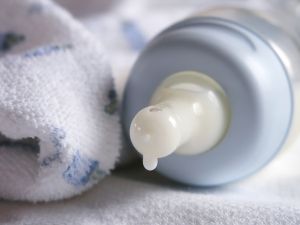Last updated on August 19th, 2022 at 11:12 pm
 A reader forwarded me a recent newsletter that was sent out by the JPMA (Juvenile Products Manufacturers Association, Inc) to its subscribers bashing the bans on BPA taking effect in the country and in Canada. In a word, they quote it “Nonsense.” Or my favorite “unscientific hysteria.” JPMA quotes, “Nonsense. Not only is there no good evidence that BPA locked into plastic can hurt people, it actually saves lives by stopping botulism. They also quote the American Council on Science and Health, which has poo pooed BPA’s dangers in the past. Interesting that the report found quotes from one organization that disagrees with the safety of BPA. (The American Council on Science and Health is also a nonprofit organization that relies on donations… hmm, I wonder who donates?)
A reader forwarded me a recent newsletter that was sent out by the JPMA (Juvenile Products Manufacturers Association, Inc) to its subscribers bashing the bans on BPA taking effect in the country and in Canada. In a word, they quote it “Nonsense.” Or my favorite “unscientific hysteria.” JPMA quotes, “Nonsense. Not only is there no good evidence that BPA locked into plastic can hurt people, it actually saves lives by stopping botulism. They also quote the American Council on Science and Health, which has poo pooed BPA’s dangers in the past. Interesting that the report found quotes from one organization that disagrees with the safety of BPA. (The American Council on Science and Health is also a nonprofit organization that relies on donations… hmm, I wonder who donates?)
I may not be a scientist, but I’m pretty sure that the people who did the studies that revealed the dangers of Bisphenol-A to humans (especially to the sensitive development of babies and children) feel differently. Such as:
- University of Rochester Medical Center’s Environmental Health Sciences Center (BPA stays in the body longer than once thought, and the volume of exposure is higher now than before)
- Yale School of Medicine: Found that BPA affected brain function and caused mood disorders in monkeys (perhaps someone should tell Yale that they don’t count as scientists)
- University of Cinncinati: Found that BPA disrupts cancer treatments
- Journal of American Medicine: Doctors in London published their findings that linked BPA to heart disease and diabetes. (“…found that the 25% of people with the highest levels of bisphenol A in their bodies were more than twice as likely to have heart disease and, or diabetes)
- University of Cinncinati: Found links to BPA and Metabolic Syndromes (which if untreated can lead to coronary artery disease, stroke and type 2 diabetes.)
- Yale School of Medicine: Found that BPA impairs brain function. After extended BPA exposure, primates had lost nerve cell connections in the parts of the brain that control memory, learning and mood.
- North Carolina State University and the National Institute of Environmental Health Sciences: Found that exposure to BPA at levels the EPA has determined are safe resulted in early onset of puberty, which is a known risk factor for breast cancer and other mental and physical health problems. Data also show higher levels of exposure to BPA can lead to significant ovarian malformations, including cysts that likely indicate infertility.
- North Carolina State University and the National Institute of Environmental Health Sciences: Discovered a connection between exposure to BPA and early puberty and reproductive health problems with female lab rats who were given doses of the chemical “equivalent to or below the dose that has been thought not to produce any adverse effects. (Biology of Reproduction)
- FDA Issues warning about BPA exposure in babies
I’m not sure why JPMA felt the need to share this with their newsletter readers, pulling quotes like “scientifically illiterate legislators are quick to panic” and highlighting scaremongering that’s making things happen. The content sounds motivated and defensive rather than weighing both sides of the issue in a thoughtful manner. It’s not what I would expect from an organization specializing in children’s products’ safety. You can see the newsletter in it’s entirety here. (It’s copied from an email into PDF)
Edited to add: It’s been clarified by JPMA that these are not their opinions and that they were merely quoting an article by John Stossel, which they do link in their newsletter in the end. However, the presentation does not lend itself to making that clear. These are not the collective opinions of JPMA and have “quoted” other articles on the contrary side of BPA in past newsletters.

